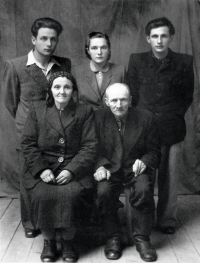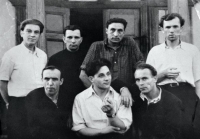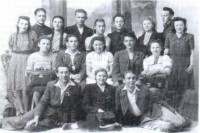When I turned 15, I was accepted... you know, officially… it wasn't very big, because I was accepted individually into the OUN youth wing. It was 1946. I was given the cover name Hrushka (Pear)... (a long pause, a response to another person: "I wish you success, we will pressure the regional council to accept some
decision"... returns to the conversation with the interviewer)... And then they were bringing me documents - "temnyky"... Temnyky, that is, brought me thematic plans, and I worked. So ... they called ... I didn't understand what my job position was, but I was, an informant in the village of Chornyi Lis and in Zbarazh district, And why? Because, I studied in the Soviet school for 7, 8, 9, 10 forms, I studied in school. And most of all (inaudible) I passed those reports ... Well, it was very difficult, because my family didn't have to know. So… I put those reports there (sighs) in the barn or "piklir" as we people used to say, in an old-fashioned way, you know. Those places... Where the grain was stored, the houses were built on high foundations... built of wood. And there were stones there too, and in order not to connect with everyone, I did that... That's how I kept a connection. Well, it so happened that one of the reports (emphasis) number three in 1947 (pause), maybe my small village, I forget, in the woods… We are from Zbarazh district, Lubyanka (inaudible). There was a district leadership of the OUN, there was a leader (emphasis) Shum, there were two deputies, a secretary - typist, and someone in the village... There was a big hideout. The entrance was in the cellar, then it went all the way under the garden because there was a secretary-typist, the works were printed there, there was a big hideout (voice drops). Someone gave out that hideout, and in fact, all four of them were shot. The 4 of them: district leader Shum, two deputies (one deputy for ideology ...his cover name was Voron, and another - deputy for household issues) and the secretary-typist ... the typist, they shot themselves. And the KGB found report number three there, written by my hand, signed by the cover name Pear. Well, I wrote it when I was 15 years old. I didn't have a big experience of conspiracy. And it was in this report that I wrote about the events at school. They gave us, Zavodianyk - he was the historian from Eastern Ukraine, and we analyzed the Battle of Poltava, and something else about Hetman Mazepa, and the dispute began. And us, students, we were not afraid, we were young children, the Soviet government came a couple of years ago, it didn't have the strength. And we, the dispute started: is he an enemy, or is he a hero, you know… There was the dispute (smiles). And I wrote about that dispute. And that was enough for the KGB, they found a test paper at school, they compared handwriting… And came to me.






